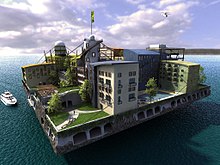seasteading
Jump to navigation
Jump to search
English[edit]
Etymology[edit]

Blend of sea + homesteading.
Pronunciation[edit]
- (Received Pronunciation) IPA(key): /ˈsiː.stɛ.dɪŋ/
Audio (Southern England) (file) - (General American) IPA(key): /ˈsiˌstɛ.dɪŋ/
- Hyphenation: sea‧stead‧ing
Noun[edit]
seasteading (uncountable)
- The creation of permanent dwellings at sea, especially outside the territory claimed by any national government.
- 1969 January, Our Nation and the Sea: A Plan for National Action: Report of the Commission on Marine Science, Engineering and Resources, Washington, D.C.: United States Government Printing Office, →OCLC, page 14, column 2:
- The territorial sea offers a new realm for individual and small business enterprises. The Commission recommends an experimental program to encourage new uses of the ocean through State leases of submarine areas within U.S. territorial waters. Such a program might be called "seasteading."
- 1969, Congressional Record: Proceedings and Debates [...], volume 115, part 21, Washington, D.C.: United States Government Printing Office, →ISSN, →OCLC, page 28085, column 2:
- Benefits from the acquisition of this new territory include the development of tremendous oil and gas reserves, new mineral, chemical and pharmaceutical resources, fish farms and such things as “seasteading” by private companies […]
- 1969, Saturday Review, volume 52, New York, N.Y.: Saturday Review Associates, →ISSN, →OCLC, page 52:
- "Seasteading" may one day assume the pioneering role in underwater colonization that homesteading played in past settlement of the grasslands of the American West.
- 1977, New Age Journal, volume 3, Brookline Village, Mass.: New Age Communications, →OCLC, page 193:
- We're a young American couple without much money who wanted to make the planet our village. Seasteading (self-sufficient boat living) was the answer.
- 2007, Pat Murphy, Paul Doherty, “Cold Comfort”, in Gardner Dozois, editor, The Year’s Best Science Fiction: Thirty-fourth Annual Collection, New York, N.Y.: St. Martin's Griffin, St. Martin's Press, →ISBN, page 295:
- The Raft was a seasteading community, a loose affiliation of over a hundred vessels that had been converted to floating farms and cities by climate refugees from small island nations that had been wiped out by rising waters.
- 2014, Darrell M. West, “Not a One-person Act”, in Billionaires: Reflections on the Upper Crust, Washington, D.C.: Brookings Institution Press, →ISBN, part 2 (It Takes a Village to Make a Fortune), page 146:
- He [Peter Thiel] has used his considerable wealth to support visionary research on anti-aging products, artificial intelligence, and "seasteading" (building new communities on the ocean, beyond the control of governments), among other initiatives.
- 2017 March, Joe Quirk, with Patri Friedman, “Home: This Isn’t Planet Earth”, in Seasteading: How Floating Nations will Restore the Environment, Enrich the Poor, Cure the Sick, and Liberate Humanity from Politicians, New York, N.Y.: Free Press, →ISBN, part I (Seavilization Now), page 30:
- As a seastead supporter wrote on one of our discussion forums, a key difference between the founders of nations and the creators of seasteads is that "seasteading aggresses against no one. That humans may settle new territory consistent with the principle of nonaggression is a remarkable development in the human experience."
Related terms[edit]
Translations[edit]
creation of permanent dwellings at sea
|
Further reading[edit]
 seasteading on Wikipedia.Wikipedia
seasteading on Wikipedia.Wikipedia